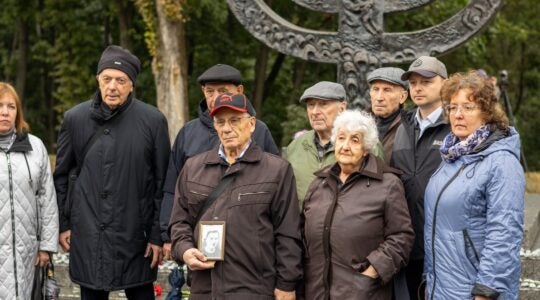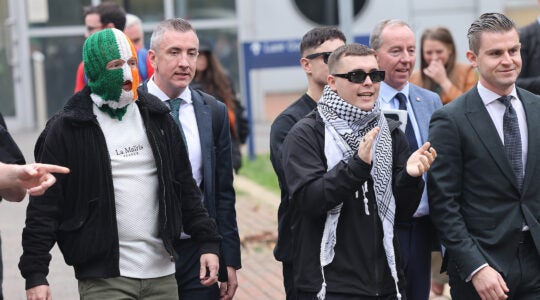
Elie Berrebi, director of the Jewish Consistory of Marseille, at the city’s Great Synagogue, Oct. 14, 2012 (Cnaan Liphshiz)

Members of Marseille’s Jewish community outside the city’s Great Synagogue, Oct. 15, 2012. (Cnaan Liphshiz)
MARSEILLE, France (JTA) — At a time when Jewish institutions across France resemble military fortresses for their security, entering the great synagogue and main Jewish center of this picturesque city on the Mediterranean coast is as easy as pushing open the front door.
The only obstacles on a recent Sunday were 20 children scampering around on their break from Hebrew school.
That same day in Paris, prosecutors announced that they may never catch all the known 10 members of a domestic, jihadist network described by French authorities as “very dangerous” and responsible for detonating a grenade in a kosher store near Paris last month.
Days earlier, French Jewry’s security unit, the SPCJ, reported a 45 percent rise in anti-Semitic attacks this year, mostly by Muslims — part of an “explosion” of incidents after the March 19 killings of three children and a rabbi in Toulouse by a French-born Muslim extremist. Terrorists may try to infiltrate synagogues on reconnaissance missions, SPCJ also warned recently.
Yet while the 350,000 Jews in and around Paris — more than any other city in Europe — have seen violent convulsions with increasing frequency, Jews here in France’s second-largest Jewish community have enjoyed relative calm.
But many of the 80,000 or so Jews who live in relative peace next to an estimated 250,000 Arabs in this seaside city of 800,000 worry that things could get worse.
In Marseille, Jewish leaders and laymen say they wear their kipahs without fear of attack, offering varying explanations for how the peace is maintained: Some cite interfaith dialogue, others point to geographic segregation and a few make mention of the deterrent threat of Jewish gangsters.
From 2009 to 2011, there were twice as many anti-Semitic attacks per capita in Paris proper than in Marseille, according to an analysis of 1,397 incidents recorded by SPCJ. Only 59 attacks were registered here in those years, compared to 340 in Paris proper.
Michele Teboul, the regional representative of the CRIF umbrella group of French Jewish communities, says these relatively low figures are part of “the miracle of Marseille.” She credits mainly the work of an interfaith dialogue group that the municipality established in 1991.
But Teboul, a businesswoman and mother of three, is worried that this effect is wearing off as “mosques continue to preach hatred” and the city’s Jewish and Muslim communities drift apart physically and mentally.
Elie Berrebi, director of Marseille’s Central Jewish Consistory — the institution responsible for administering religious services for French Jews — describes the presence of “a small but well-positioned” Jewish mafia as a deterrent to would-be Muslim aggressors, saying that attacking Jews here carries special risks.
“It’s a well-known secret that this community has its own gangsters,” he said. “Not many, but in powerful positions in that world. They speak the language of the other side’s criminals.”
Approximately 50 Jewish gangsters from Marseille are currently in jail, where the Jewish community offers them what services it can, according to Berrebi. One of them, identified only as Daniel S., was the subject of a feature published in August by the French weekly Marianne titled the “The revival of the Jewish Mafia.”
Bruno Benjamin, president of the Marseille Jewish community, dismisses the Jewish gangster theory.
“The Arabs have many more gangsters,” he said.
In 2002, Marseille saw the first synagogue arson attributed to anti-Semitism since World War II when the northern Or Aviv shul was burnt to the ground.
“Since the early 2000s, we’ve been seeing long periods of calm interrupted by eruptions of anti-Semitism,” Berrebi said. Jews in Marseille’s northern parts “have been hit pretty hard,” he said, since the early 2000s, when anti-Semitic attacks spiked in France.
Since then, the city’s Jewish population has gravitated away from the center and northern Marseilles in favor of middle-class neighborhoods in the city’s south, which Berrebi describes as safer. Approximately 80 percent of Marseille’s Jews now live in that part of town, he says. Arab families also are migrating from the center northward and eastward to working-class areas.
The separation is a mixed blessing, Berrebi says. While it insulates Jewish families from potential Muslim aggressors, “it means that there is a new generation growing up without knowing Jews, with a strong us-versus-them notion,” he said.
Berrebi arrived here as a boy in 1967. Like 90 percent of Marseille’s Jews, his family emigrated from North Africa shortly after the Maghreb — Morocco, Algeria, Tunisia — gained independence from France in the 1950s. Arabs also came in large numbers and settled in the same neighborhoods as the Jews.
“We used to live together. My generation and the previous one had a lot of commercial exchange with the Arabs,” he said. This familiarity prevented hate crimes, he said, “but the younger generations have lost it.”
Meanwhile, one of Marseille’s biggest problems is unemployment — 30 percent above the national average in 2012 — and the accompanying crime. In 2011, some 26 physical assaults occurred here daily, and armed robbery rose by 40 percent from 2010, according to police statistics.
Lawlessness always seems to be nearby, with ethnic tensions roiling just beneath the surface. In July, what began on the street as a robbery ended in rape and assault after the perpetrator — a Muslim man whom authorities judged to be mentally unsound — saw his elderly victim’s mezuzah on the front doorway of her home, according to her account.
On Saturday, a convoy of seven reckless drivers raced down Rue Paradis, near the city’s great synagogue. In one car, women ululated while the driver swerved violently in consecutive hand-brake skids. In another, five men shouted and waved the Algerian flag. A passing police car only provoked them to intensify their conduct, then passed them.
Benjamin, Marseille’s Jewish community president, credited the non-confrontational approach of city authorities in the predominantly Arab neighborhoods with keeping things quiet.
“Some of the relative peace here owes to police not kicking those hornets’ nests,” he said.
Other members of the community praise Marseille Mayor Jean-Claude Gaudin’s “declaredly pro-Israel” attitude.
“It sets the tone and discourages pro-Palestinian sentiment from turning anti-Semitic,” Berrebi said.
Even so, when Berrebi’s daughter wanted to move to Israel, he said he did not try to dissuade her. “There’s a growing realization we won’t be able to stay here indefinitely,” he said.
Jean-Jaques Zenou, 40, is the president of Radio JM, the area’s Jewish radio station. The Marseille native says he wishes his five children would immigrate to Israel.
“Even in Marseille, I get frightened when I stop to compare our reality to that of the 1990s,” he told JTA. “We have terrorist networks, a very strong far right. And what happened in Toulouse.”
Zenou says the community “may be behaving naively” by sufficing with relatively lax security arrangements.
“After all,” he said, “it’s not like the Jewish community of Toulouse ever expected what happened there.”
JTA has documented Jewish history in real-time for over a century. Keep our journalism strong by joining us in supporting independent, award-winning reporting.





